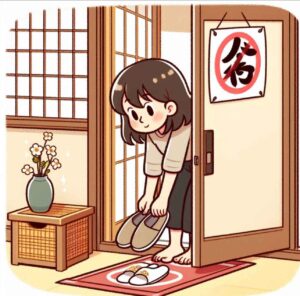Welcome Blessings!
(Tap 🔽 to see more topics!)


If you plan a trip to Japan, you’re in for an unforgettable experience! The stunning landscapes, rich history, and cutting-edge technology make it a dream destination for many. But Japanese culture is also known for its unspoken rules, and if you’re not careful, you might accidentally come off as rude without even realizing it.
From bowing at the right angle to handling chopsticks properly, Japanese etiquette plays a huge role in daily life. It’s one of the key reasons Japan is known for its politeness, efficiency, and harmony. Japan’s polite and orderly society is one of the main reasons why so many travelers fall in love with the country. The good news? You don’t have to be an expert in all the customs. Knowing a few key rules can make a big difference in how locals perceive you.
While the locals generally forgive foreigners’ mistakes, following essential customs will earn you much respect. Learning about these traditions can enhance your travel experience, helping you connect more deeply with the culture. So, what should you watch out for? Should you tip at restaurants? How loud is too loud on public transportation? Is it okay to talk on your phone in cafes? What’s the proper way to exchange business cards?
That’s why I’ve compiled this list of 8 must-know Japanese etiquette tips for foreigners. Whether it’s dining manners, subway makes and don’ts, or shrine and temple rules, these essential cultural insights will help you avoid awkward situations and show respect to the locals.
Understanding Japanese customs isn’t just about avoiding embarrassment. It’s about immersing yourself in the culture and making your trip even more memorable. Before you step off that plane and explore Japan’s incredible world of traditions, let’s go over the basics because a little effort goes a long way!

One of the most common aspects of Japanese culture is removing shoes when entering certain establishments, such as homes, temples, traditional inns, or restaurants. This custom is rooted in the desire to maintain the cleanliness and comfort of indoor spaces and demonstrate respect for the host or location. Visitors will typically find a designated area near the entrance where they can remove their shoes and use the slippers provided by the host.
It is essential to place one’s shoes neatly facing the door and refrain from wearing outdoor shoes inside or indoor slippers outside. Additionally, it is worth noting that different areas may require other slippers, such as bathroom or tatami slippers. Visitors should notice local cues or signs to switch their slippers accordingly. Some examples of where to take off shoes are:
Bowing is a customary and significant way of communicating in Japan. It is a way of demonstrating respect, appreciation, regret, or greeting to someone. The degree and length of the bow vary depending on the circumstance and the connection between the individuals. Typically, the deeper and longer the bow, the more polite it is. However, foreigners are not expected to be able to perfect the subtleties of bowing, and in most cases, a simple nod or slight bow of the head will suffice. You can also include verbal greetings, such as “Konnichiwa” (hello) or “arigato gozaimasu” (thank you very much), when bowing.
Some instances of when bowing is required are as follows:
In Japan, specific manners and etiquette regarding eating and drinking should be followed. It is essential to avoid sticking your chopsticks upright in your rice, as this is considered rude and is associated with funeral rituals. Avoid passing your food from chopstick to another chopstick as this is also taboo, as it has death connotations. It is also impolite to point or gesture with your chopsticks or use them to skew or stab your food. When not using your chopsticks, place them on the chopstick rest or the edge of your plate.
When drinking alcohol, it is customary to pour drinks for each other rather than for yourself. It is a way of showing hospitality and friendship. After everyone has poured their drinks, make a toast with “kanpai” (cheers) before drinking. It is also essential to keep your glass from becoming empty, as this implies that you want more. If you do not wish to drink, politely decline by leaving your glass full or covering it with your hand.
When eating at a restaurant, it is proper to say “itadakimasu” (I gratefully receive) before starting your meal and “gochiso sama deshita” (thank you for the meal) after finishing your meal. These phrases express your appreciation for the food and the service. You can also show your gratitude by complimenting the chef or staff with “oishii” (delicious) or “umai” (tasty).
Japanese people don’t expect tips when paying bills. Tipping is considered rude and implies inadequate service or the staff requiring charity. Instead, spend the exact amount or round up to 100 yen. When leaving, it is also polite to say “arigato gozaimasu” (thank you very much) or “gochisosamadeshita” to the staff.
If you plan to visit Japan’s beautiful and sacred temples and shrines, following some etiquette and manners is essential to show respect for the religion and culture. Some guidelines that you should keep in mind are the following:

Japan has a highly efficient and convenient public transportation system, encompassing trains, buses, subways, and taxis. However, observing proper etiquette and manners is crucial in ensuring a smooth and enjoyable ride for yourself and your fellow passengers. Some guidelines to follow are the following:
If you shop in Japan, you should adhere to several customs and protocols. Japan offers a variety of shopping options, from traditional markets and crafts to modern malls and electronics. You can find numerous unique and high-quality products that make excellent souvenirs for yourself, friends, and family. However, there are certain etiquette and manners that you should follow when shopping in Japan.
Japan is a spotless and tidy country, and the people take pride in keeping their environment and public spaces neat and orderly. However, Japan also has a strict and complex garbage disposal system, which requires careful sorting and separation of different types of waste. Some tips on how to dispose of your garbage correctly in Japan are as follows;

In Japan, gift-giving and receiving are customary practices with significant cultural value, especially on special occasions like weddings, birthdays, holidays, and visits. Gifts are a way of expressing appreciation, respect, friendship, or apology to someone. However, in Japan, people must follow certain etiquette and manners when giving or receiving gifts. Some essential guidelines are as follows:
These are some of the essential etiquette and manners to remember in Japan. While there are many other details and variations to be aware of, following these tips will ensure a respectful and enjoyable experience in this beautiful country. Do you know any other Japanese etiquette and manners we should understand as foreigners living and working in Japan? Let us know in the comment below. Thanks for joining us today! Voila! Until next time!